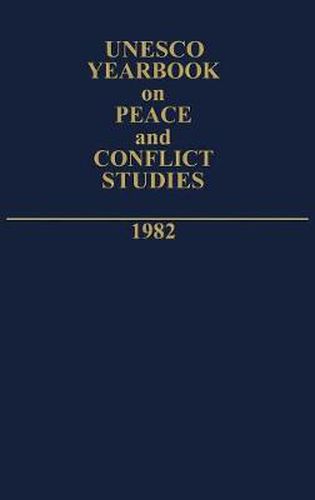Readings Newsletter
Become a Readings Member to make your shopping experience even easier.
Sign in or sign up for free!
You’re not far away from qualifying for FREE standard shipping within Australia
You’ve qualified for FREE standard shipping within Australia
The cart is loading…






This is the annual volume in a continuing UNESCO series that addresses a range of issues in the field of peace and conflict resolution. It provides an up-to-date overview of research on disarmament within the social sciences as well as background information to the new thinking about global security that emerged in 1988 and which has spurred the relaxing of international tensions. The volume also presents an invaluable comparison of viewpoints on the post-Cold War future and on the linking of disarmament to development issues. Changes in enemy perception, the problems of conversion (both economic and psychological) from military to peaceful production, and the growing danger of non-military threats to peace are among the phenomena analyzed here by a group of the world’s leading scholars of peace and conflict studies. Information and insights into current conditions and a survey of the potential problems that could negatively affect the evolution of the new thinking and common security ideologies are offered by each author in chapters that represent important contributions to the discourse and discussion on peace and conflict. Following an introductory chapter that places the individual articles of the Yearbook in the context of the new thinking, Anatoli Leonidovich Adamichin demonstrates how the new thinking of Soviet policy makers is already reversing dangerous elements of the Cold War–a fact underlined by recent events in Eastern Bloc countries. The concepts of creative space and creative internationalism are investigated by Robert C. Johansen in his article on U.S.-Soviet security. K. Subrahmanyam considers disarmament and development, focusing on the imperatives of theinterdependence of issues and peoples, and Hans Gunter Brauch surveys recent and on-going international research on disarmament in the social and human sciences. Chapters on regional developments and on the Unesco peace and disarmament programs complete the volume. For researchers, teachers, and students of peace and conflict resolution, this review of basic concepts, issues, and literature is an essential tool. Activists, concerned general readers, government and political leaders, and members of the diplomatic corps will find it not only factual but a source of inspiration and an incentive to practical action in the promotion of peace and security.
$9.00 standard shipping within Australia
FREE standard shipping within Australia for orders over $100.00
Express & International shipping calculated at checkout
This is the annual volume in a continuing UNESCO series that addresses a range of issues in the field of peace and conflict resolution. It provides an up-to-date overview of research on disarmament within the social sciences as well as background information to the new thinking about global security that emerged in 1988 and which has spurred the relaxing of international tensions. The volume also presents an invaluable comparison of viewpoints on the post-Cold War future and on the linking of disarmament to development issues. Changes in enemy perception, the problems of conversion (both economic and psychological) from military to peaceful production, and the growing danger of non-military threats to peace are among the phenomena analyzed here by a group of the world’s leading scholars of peace and conflict studies. Information and insights into current conditions and a survey of the potential problems that could negatively affect the evolution of the new thinking and common security ideologies are offered by each author in chapters that represent important contributions to the discourse and discussion on peace and conflict. Following an introductory chapter that places the individual articles of the Yearbook in the context of the new thinking, Anatoli Leonidovich Adamichin demonstrates how the new thinking of Soviet policy makers is already reversing dangerous elements of the Cold War–a fact underlined by recent events in Eastern Bloc countries. The concepts of creative space and creative internationalism are investigated by Robert C. Johansen in his article on U.S.-Soviet security. K. Subrahmanyam considers disarmament and development, focusing on the imperatives of theinterdependence of issues and peoples, and Hans Gunter Brauch surveys recent and on-going international research on disarmament in the social and human sciences. Chapters on regional developments and on the Unesco peace and disarmament programs complete the volume. For researchers, teachers, and students of peace and conflict resolution, this review of basic concepts, issues, and literature is an essential tool. Activists, concerned general readers, government and political leaders, and members of the diplomatic corps will find it not only factual but a source of inspiration and an incentive to practical action in the promotion of peace and security.